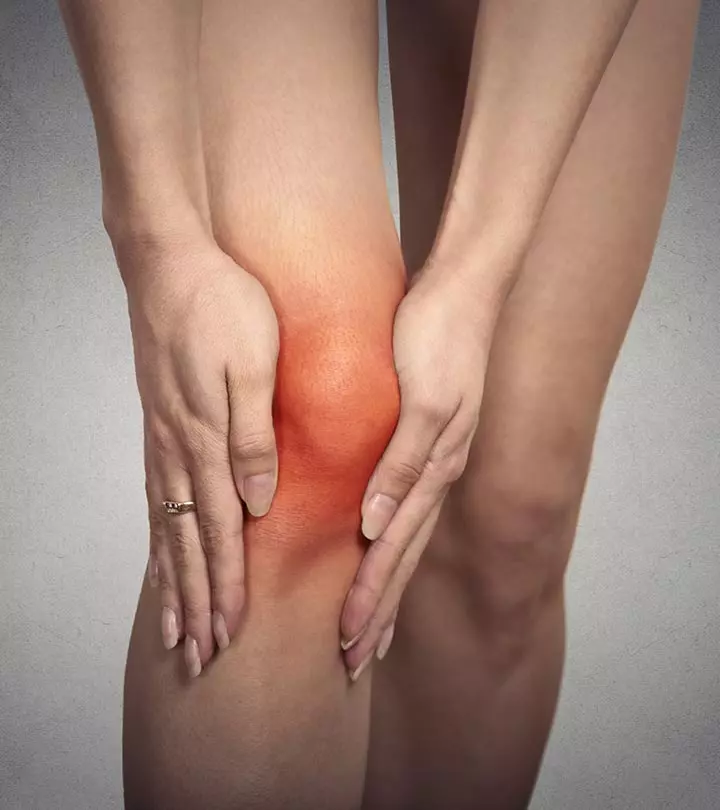How To Increase Stamina: 8 Natural Ways For Sustained Energy
Expert advice and tips to help your body organically reach its full potential

Image: Shutterstock
Stamina is simply the energy and strength required to complete a physical task for a long period. Increased stamina can help you get through stress and discomfort experienced during strenuous physical activities without much exhaustion and fatigue. With a couple of changes in your diet and some exercises, you can increase your stamina naturally and perform daily tasks optimally. In this article, we explore some of the natural ways to increase your stamina.
In This Article
What Is Stamina?
Stamina is the strength that allows you to endure long periods of vigorous physical activity or mental effort. Increased stamina can help you endure stress and discomfort during strenuous activity. It can also help reduce fatigue and exhaustion that often follow a vigorous activity. If you have high stamina, you can also perform day-to-day activities at a higher level while using less energy.
Natural Ways To Increase Your Stamina
1. Follow A Healthy Diet
If you are into high-intensity workouts or activity, your diet can supplement the energy required to complete the activity. Along with proteins and fats, you must increase the intake of carbohydrates if you perform high-intensity activities. These carbohydrates can provide energy quickly as they can be easily metabolized to release energy (1). This, in turn, increases your stamina and helps enhance endurance.
You can consume bananas and apples, foods rich in fiber, such as berries, cereal grains, etc., brown rice, and other starchy foods, such as sweet potatoes, to supplement your body with carbohydrates and increase your stamina (2), (3), (4). These foods can provide sustained periods of stamina as they can impact the metabolism of carbohydrates.
There is a wide array of energy-giving foods to boost stamina that you can explore. These foods can increase your energy levels, leading to improved performance in your daily activities. The options are plentiful, from fruits and vegetables to whole grains and lean proteins.
However, one must avoid the intake of dairy products, processed foods, such as pasta, alcohol, fried foods, and low-calorie foods and beverages as they can lower energy levels. Consuming the incorrect amount of calories in every meal or changing the portion size of every meal can affect the level of energy as well as satiety (5). This can lead to either an increase or a decrease in the intake of food.
2. Exercise Regularly
Exercising is another way to build your stamina. Whether it is a typical run on the treadmill, swimming, cycling, or aerobics, exercise promotes cardiovascular fitness (6). This, in turn, can help increase stamina, endurance, strength, and flexibility (7).
According to a meta-analysis of 26 studies involving more than 4000 participants, it was found that exercise can help improve the quality of life. It improved both the general quality of life by 1.05 standardized mean difference (SMD) and mental well-being by 0.42 SMD.
 Quick Tip
Quick TipCody Lefever, professional physical trainer and blogger, discusses his perspective on exercise and baseline weight training to increase stamina. According to him, a daily routine including two to four exercises with a total rep goal is good enough for baseline training. He discusses his observations with clients at his gym, noting, “Over the course of many workouts this basic warm up has developed their legs, back, and trunk to the point that the most common weaknesses quickly become their strength. While adding tension or time to a movement I also challenge them to move faster between exercises and to complete the reps faster. As a result, not only are they getting better with these exercises, but their stamina begins to improve because the density of the warm-up (their baseline) increases (i).”
3. Practice Meditation And Yoga
Meditation and yoga are natural ways to relax and reduce stress. Several poses in Iyengar Yoga emphasize on standing poses that can eventually help enhance stamina, alignment of body, and strength (8). This also builds your physical endurance in the long run.
4. Listen To Music
Listening to music during an intense workout session, as research shows, decreases dyspnea or shortness of breath (9). This may help increase your tolerance and stamina while engaging in high-intensity exercises.
5. Have Ashwagandha
Ashwagandha
is an herbal supplement that has been associated with improved cardiovascular endurance and stamina. Research shows that it can enhance longevity and immunity (10).
You can take a supplement of this herb in tablet or powder form. Make sure you consult your doctor for the right dosage as excessive consumption of ashwagandha can cause vomiting and diarrhea.
6. Consume Caffeine
Caffeine consumption can boost energy as it leads to an increased release of dopamine and noradrenaline (11). This can make you feel more alert and energetic and increase your ability to undergo physical exertion.
Note: Excessive consumption of caffeinated drinks can increase your blood pressure, heart rate, and the urge to urinate and induce insomnia and anxiety.
7. Quit Smoking
Research shows that smoking has a deleterious effect on endurance capacity (12). It can impact your stamina and energy levels and help you feel less short of breath while performing intense physical activity.
8. Breathing Exercises
Breathing exercises can enhance stamina by improving lung capacity, oxygenating the body, and reducing fatigue. Try out the below exercises:
1. Diaphragmatic Breathing: Lie down or sit comfortably. Take a deep breath through your nose so that your abdomen expands. Slowly exhale through your mouth, letting your abdomen contract. Repeat for several cycles. This exercise strengthens the diaphragm and increases oxygen intake.
2. Pursed Lip Breathing: Inhale through your nose, then exhale slowly through pursed lips (as if blowing out a candle). This technique regulates breathing, reduces shortness of breath, and enhances endurance during physical activity.
Regular practice of these exercises can improve respiratory function, stamina, and overall endurance, benefiting activities requiring prolonged physical effort (13). Always consult a healthcare professional before starting new exercises, especially if you have pre-existing health conditions.
 Quick Tip
Quick TipHow Long Does It Take To Increase Your Stamina?
There is no shortcut to building your stamina. A closely monitored study showed that it took close to 14 days for the subjects of the study to build strength and stamina (or cardiopulmonary reserve) (14). However, the exact duration can differ from person to person as it depends on factors, such as the health of the individual and the motivation to increase strength and endurance.
Stamina is generally described as the strength for enduring strenuous, stressful, or continuous physical and mental efforts over long periods. It is a coveted quality as it allows individuals to complete more tasks or difficult tasks without exhausting themselves. Following a healthy diet, exercising regularly, practicing yoga and meditation, quitting cigarettes, and taking certain herbal supplements are some of the ways to increase stamina naturally. However, you cannot expect to increase your stamina overnight as it takes around a fortnight to build up stamina in general and may take shorter or longer depending upon various factors such as health and motivation.
Frequently Asked Questions
What causes low stamina?
Dehydration, mood disorders, lack of sleep, poor diet, certain drugs and medications, poor lifestyle choices, and illness are the most common causes of low stamina.
Which fruit is best for stamina?
Banana is considered to be one the best foods for stamina as it is rich in natural sugars, carbohydrates, fibers, and minerals.
Key Takeaways
- Increasing your stamina naturally requires a holistic approach that takes your physical as well as mental well-being into account.
- Exercising regularly, consuming a balanced diet, and managing your stress levels can help enhance your overall stamina.
- Staying hydrated throughout the day and gradually increasing the duration of workouts can also boost improvement in your stamina.
If you get tired quickly, you need to build your stamina. This video will take you through the best food options you can include in your diet for it. Check it out!
Personal Experience: Source
StyleCraze's articles are interwoven with authentic personal narratives that provide depth and resonance to our content. Below are the sources of the personal accounts referenced in this article.
(i) Your Baselinehttps://swoleateveryheight.blogspot.com/2025/12/your-baseline.html
References
Articles on StyleCraze are backed by verified information from peer-reviewed and academic research papers, reputed organizations, research institutions, and medical associations to ensure accuracy and relevance. Read our editorial policy to learn more.
- High-Quality Carbohydrates and Physical Performance, Nutrition Today, US National Library of Medicine, National Institutes of Health.
https://www.ncbi.nlm.nih.gov/pmc/articles/PMC5794245/ - Bananas as an energy source during exercise: a metabolomics approach. PloS One, US National Library of Medicine, National Institutes of Health.
https://pubmed.ncbi.nlm.nih.gov/22616015/ - Impact of dietary polyphenols on carbohydrate metabolism. International Journal of Molecular Sciences, US National Library of Medicine, National Institutes of Health.
https://pubmed.ncbi.nlm.nih.gov/20480025/ - Slowly digestible starch: concept, mechanism, and proposed extended glycemic index. Critical Reviews in Food Science and Nutrition, US National Library of Medicine, National Institutes of Health.
https://pubmed.ncbi.nlm.nih.gov/19960393/ - Effects of Food Quality, Quantity, and Variety on Intake, Bookshelf, US National Library of Medicine, National Institutes of Health.
https://www.ncbi.nlm.nih.gov/books/NBK232454/ - Aerobic vs anaerobic exercise training effects on the cardiovascular system, World Journal of Cardiology, US National Library of Medicine, National Institutes of Health.
https://www.ncbi.nlm.nih.gov/pmc/articles/PMC5329739/ - Aerobic exercise and endurance: improving fitness for health benefits. The Physician and Sportsmedicine, US National Library of Medicine, National Institutes of Health.
https://pubmed.ncbi.nlm.nih.gov/20086470/# - Exploring the therapeutic effects of yoga and its ability to increase quality of life, International Journal of Yoga, US National Library of Medicine, National Institutes of Health.
https://www.ncbi.nlm.nih.gov/pmc/articles/PMC3193654/ - The Impact of Listening to Music During a High-Intensity Exercise Endurance Test in People With COPD. Chest, US National Library of Medicine, National Institutes of Health.
https://www.ncbi.nlm.nih.gov/pmc/articles/PMC4687242/ - Efficacy of Ashwagandha (Withania somnifera [L.] Dunal) in improving cardiorespiratory endurance in healthy athletic adults, AYU, US National Library of Medicine, National Institutes of Health.
https://www.ncbi.nlm.nih.gov/pmc/articles/PMC4687242/ - A Daily Cup of Tea or Coffee May Keep You Moving: Association between Tea and Coffee Consumption and Physical Activity, International Journal of Environmental Research and Public Health, US National Library of Medicine, National Institutes of Health.
https://www.ncbi.nlm.nih.gov/pmc/articles/PMC6163361/ - Smoking, alcohol consumption, and endurance capacity: an analysis of 6,500 19-year-old conscripts and 4,100 joggers. Preventive Medicine, US National Library of Medicine, National Institutes of Health.
https://pubmed.ncbi.nlm.nih.gov/3258987/ - Impact of a Breathing Intervention on Engagement of Abdominal, Thoracic, and Subclavian Musculature during Exercise, a Randomized Trial
https://www.ncbi.nlm.nih.gov/pmc/articles/PMC8397177/ - How long does it take to become fit? British Medical Journal, US National Library of Medicine, National Institutes of Health.
https://www.ncbi.nlm.nih.gov/pmc/articles/PMC1714901/
Read full bio of Merlin Annie Raj
Read full bio of Shaheen Naser
Read full bio of Arshiya Syeda
Read full bio of Dipti Sharma


























Community Experiences
Join the conversation and become a part of our empowering community! Share your stories, experiences, and insights to connect with other beauty, lifestyle, and health enthusiasts.